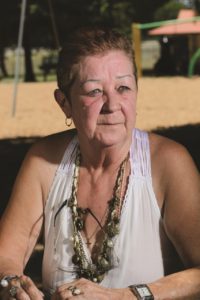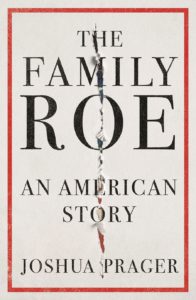Joshua Prager was hitting one dead end after another in 2010. A former senior writer for the Wall Street Journal and the co-founder of Provincetown’s Twenty Summers series, Prager was researching an article on the aftermath of Roe v. Wade, zeroing in on how “Jane Roe” and her family were affected by the landmark Supreme Court case. This meant finding the “Roe baby” — the plaintiff’s child.

While the Court’s decision in the case secured the Constitutional right to abortion, Norma McCorvey, the woman called “Jane Roe” in the suit, had to deliver the child she sought to abort. The legal action kicked off in Dallas County, Texas and continued for three years. As the case worked its way through the courts, the Texas statute that criminalized abortion remained standing. By the time the Court finally struck it down in 1973, McCorvey’s daughter was a two-year-old living with her adoptive mother in Dallas.
“The pro-life world viewed this child as the living incarnation of their argument against abortion,” Prager says. “They said, ‘If Roe had been the law, you would have murdered this human being.’ This struck me as fascinating. I wanted to find this person.”
He asked McCorvey for help, but she refused to talk unless Prager paid her — a violation of journalism ethics. “If you pay someone for their story,” Prager says, “then you’re compromised.”
The only person who knew the Roe baby’s identity was Henry McCluskey, the lawyer who had arranged the adoption. McCluskey had died, but Prager tracked down the attorney’s sister, who let him sift through McCluskey’s records. He found no clues.
Researching McCorvey’s life meant delving into her relationships: flings with men, a fleeting marriage at 16, affairs with women. Along the way, Prager met Connie Gonzales, McCorvey’s girlfriend of 35 years. Despite McCorvey’s infidelity, Gonzales stuck by her side until 2009, when McCorvey left her.
Gonzales was struggling, living with the aftermath of a stroke. Soon after the split, foreclosure loomed on the house she had shared with McCorvey. As Gonzales prepared to move out, she and her niece found a trove of McCorvey’s papers in the garage. McCorvey had no interest in them, so they were destined for the dump.
Gonzales mentioned this, and Prager perked up. “Those are important papers,” he told her. “Can I have them?”
They stuffed the documents into trash bags and loaded them into Prager’s rental car. After sorting through thousands of letters, tax forms, and doctor’s prescriptions, Prager found the clue he was looking for. In an interview McCorvey gave to a Catholic newsletter, she mentioned the Roe baby’s birthdate: June 2, 1970.

Prager delved into Dallas County’s records. Thirty-seven girls were born on that date. Prager knew that the Roe baby eventually lived in Washington state and, of those 37, only one name matched this description: Shelley Lynn Thornton.
“I do a lot of sleuthing for my articles,” Prager says. “When that’s finished, the real work begins, which is getting to know human beings and rendering them honestly, truthfully, and kindly onto the page.”
Prager initially planned to write about how he met Shelley, but along the way he also met her two older sisters, both of whom had also been adopted. Melissa, the eldest, was raised by McCorvey’s own mother. Jennifer, the second, grew up with a Dallas couple.
Later on, McCorvey warmed up to Prager, and his book follows her as she is transformed from a waitress to “Jane Roe,” and from there, how her persona swiveled between two extremes. In the 1980s, she was the spotlight figure for abortion rights. A decade later, she became a churchgoer and ultimately switched sides and joined the militant anti-abortion organization Operation Rescue. She also bent to the demands of that group’s leaders and renounced her homosexuality.
“An article turned into a book,” Prager says. “And then a book turned into an epic book.”
Prager declined to pay McCorvey for an interview, but after consulting with journalist Paul Steiger of the Pulitzer board and Cullen Murphy, one of his editors at The Atlantic, he agreed to pay her for her papers. “They said it was proper to notify her that there was value to them,” he says, “so I rescued them.”
Those trash bags from Gonzales’s garage turned out to be important for fact-checking McCorvey’s statements. “She was a difficult, complicated person,” Prager says. “She lied endlessly. She abused alcohol and drugs, so sometimes she didn’t remember what had happened.”

The papers were a “treasure map” of names and dates, he says, which he corroborated in endless interviews. After 11 years of research and writing, The Family Roe hit bookstore shelves in September 2021.
The book has been embraced by both sides of the abortion debate, which has surprised Prager. It includes his brief disclaimer that, for the record, he supports abortion rights. Writing in the New York Times, Anand Giridharadas called it “an honest glimpse into the American soul.” Yet it has garnered praise from Peggy Noonan, an ardent abortion opponent who was a speech writer for Ronald Reagan. The evangelical Christianity Today also reviewed the book glowingly.
“I was trying to be fair to both sides,” Prager says, “starting with calling them by what they wish to be called: ‘pro-choice’ and ‘pro-life.’ The pro-choice would never call the other side ‘pro-life.’ And vice versa.”
Meanwhile, the documents that jump-started his book are at Harvard’s Schlesinger Library. Prager sold them, along with other records compiled over the years, to Harvard. He says he intended to split all the proceeds immediately among the three sisters — but the issue of paying subjects for their stories re-emerged. To avoid compromising his journalistic integrity, Prager says, he kept quiet about the transaction until The Family Roe was finished. Each sister has received roughly $40,000, he says.
“One of the daughters in particular had very little money, and this meant an enormous amount to her,” he says. “Norma had died and left them nothing but debt, so this was the only time they’d ever benefited financially from her.”



